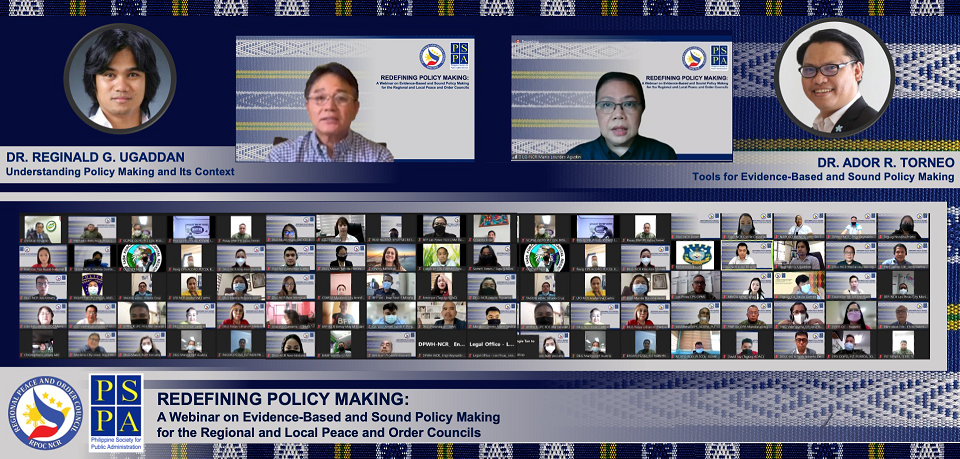
The Regional Peace and Order Council-NCR (RPOC-NCR), through the Special Action Committee-Administrative Governance (SAC-AG), held a 2-day webinar entitled âSound Policy Making for Peace and Order Councilsâ from September 20 to 21, 2021. The webinar aims to capacitate local peace and order councils on the strategies and methods of sound policymaking and familiarize them with the processes involved in participatory planning and citizenship engagement in pursuit of peace development objectives. The event is the second and final installment in a series of webinars on policymaking organized by RPOC-NCR.
Participants in the webinar consisted of representatives from the Local Peace and Order Councils (LPOCs) of all 17 NCR LGUs, RPOC member agencies, and DILG-NCR Field Officers.
RPOC-NCR Head Secretariat and DILG-NCR Regional Director Maria Lourdes L. Agustin CESO III gave the welcome remarks reminding the participants that trust is an indispensable element in the relationship between government and the citizenry, and that sound and effective policymaking is the glue that keeps this relationship strong over time.
The two subject matter experts who were engaged for the event were: Dr. Reginald G. Ugaddan, Director of the Center of Public Administration and Governance of the University of the Philippines and Dr. Ador R. Torneo, Director of the Jesse M. Robredo Institute of Governance of De La Salle University.
Professor Ugaddan expounded on the tools used for evidence-based policymaking and the processes involved â from problem identification to agenda-setting to evaluation. At the same time, he encouraged policymakers to incorporate strategic foresight and futures thinking methodology in creating scenarios for which to craft policies and action programs. He also introduced the conceptual linkage between public policy and public value. The professor finished the lecture with some insights into evidence-based policymaking.
Dr. Torneo provided a case study type of pedagogy in public policymaking. His lecture focused on the impact of policy on human behavior, citing instances when policy caused unintended consequences that often made the problem sought to be solved to worsen, emphasizing that the best policies are arrived at by careful analysis and a healthy grounding based on facts and knowledge of human behavior. He concluded his lecture with an enumeration of the criteria used in evaluating public policy.
At the conclusion of the webinar, RPOC-NCR Chairman and Paranaque City Mayor Edwin L. Olivarez gave a closing statement that called for greater coordination between RPOC and LPOC to maximize the use of the considerable resources that are available to advance the peace and order agenda of the 17 cities and lone municipality that comprise the NCR. He reiterated the interdependence of these local jurisdictions but noted the need to reduce duplication and overlaps among their plans and programs. Finally, he batted for participatory planning and policymaking at the local and regional levels.
